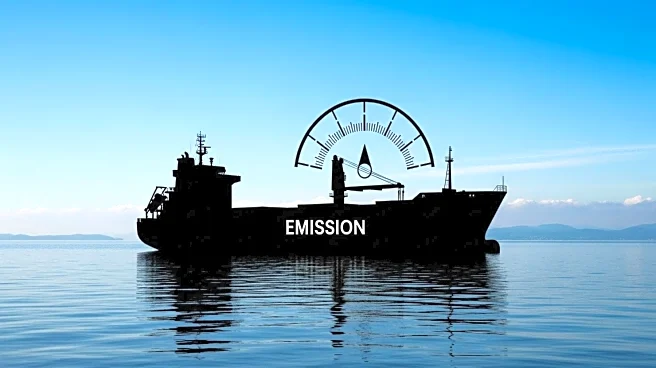What is the story about?
What's Happening?
The International Maritime Organization (IMO) is set to meet this week to decide on implementing a carbon emissions price on global shipping. This proposal is backed by an EU-led bloc, including Britain, China, and Japan, but faces strong opposition from the United States. The preliminary deal, struck in April, aims to charge the shipping industry for emissions, a move the U.S. has resisted by pulling out of related talks. The U.S. has threatened reciprocal measures, such as visa restrictions and sanctions, against countries supporting the levy. The IMO's environmental committee will discuss the proposal from October 14-17, with the U.S. expected to participate. The proposed standard would impose fees on ships exceeding emissions thresholds, rewarding those using cleaner fuels. Revenues would be collected by an IMO Net-Zero Fund, with details on distribution yet to be finalized.
Why It's Important?
The decision by the IMO could significantly impact international shipping, a major contributor to global emissions. The U.S. opposition highlights tensions between major economies over climate regulations, potentially affecting international trade relations. If adopted, the levy could incentivize cleaner fuel use, reducing the environmental impact of shipping. However, the U.S. stance may lead to diplomatic strains, particularly with EU nations advocating for the measure. The financial implications are substantial, with research suggesting the levy could generate $11 billion-12 billion annually by 2030. This could reshape the shipping industry's approach to emissions, influencing global climate policy and economic dynamics.
What's Next?
The upcoming IMO meeting will be crucial in determining the fate of the emissions levy. Should the measure be adopted, the U.S. may implement retaliatory actions, affecting international shipping and diplomatic relations. The EU and other supporting nations will likely push for the levy, emphasizing its environmental benefits. The outcome could set a precedent for future climate regulations in the shipping industry, impacting global trade and environmental policies. Stakeholders, including shipping companies and environmental groups, will closely monitor developments, anticipating potential shifts in industry standards and international cooperation.
Beyond the Headlines
The proposed emissions levy raises broader questions about global climate governance and the role of international organizations in enforcing environmental standards. The U.S. opposition underscores the challenges in achieving consensus on climate action, reflecting differing priorities among nations. The measure could prompt discussions on equity in climate policy, considering the economic impact on developing countries reliant on shipping. Long-term, the levy could drive innovation in cleaner shipping technologies, contributing to global efforts to combat climate change.















